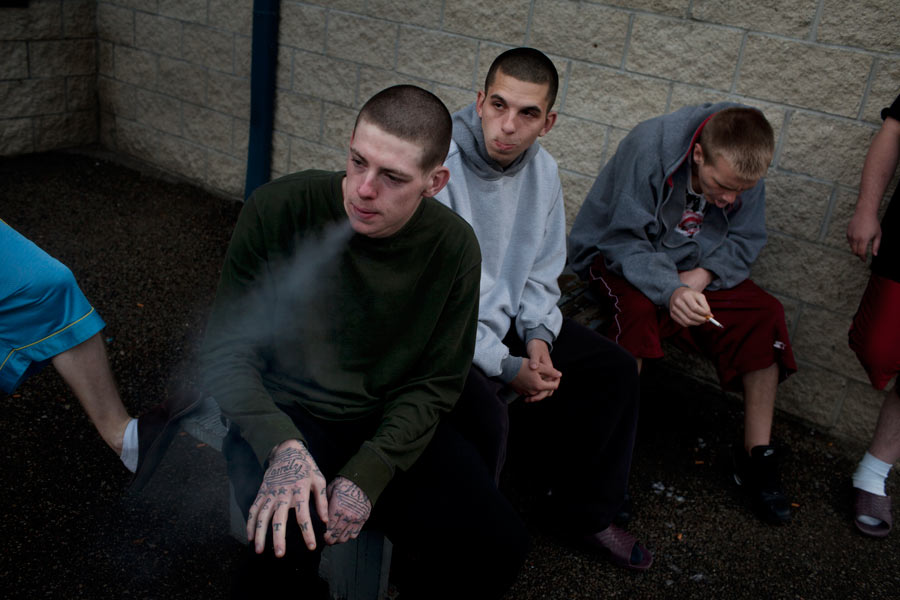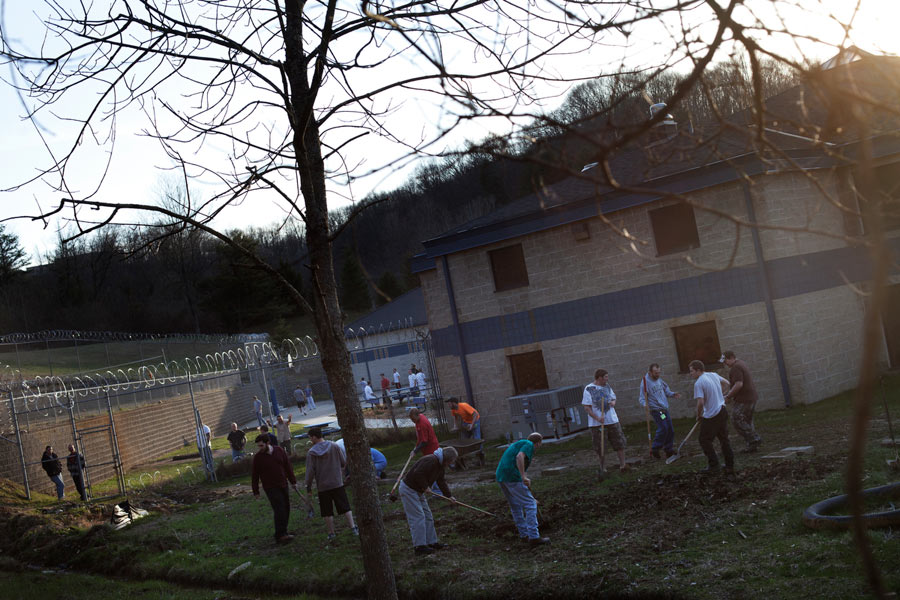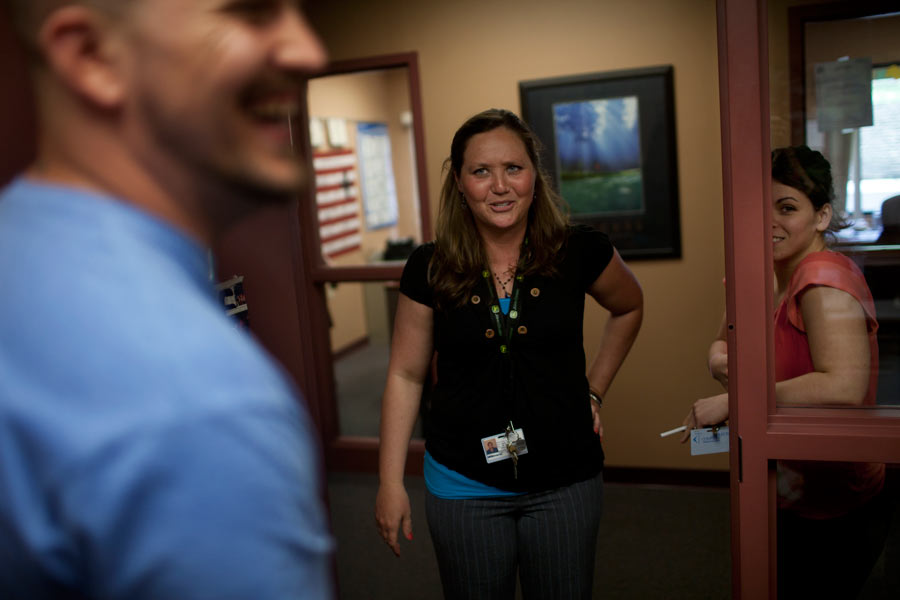Previous | 1 | 2 | 3 | 4 | Next
Almost Out
(Continued)
GOING HOME
It is a Saturday night in April and Nikki Geer sits at the small writing desk in his room, 11 hours before he walks free out of SEPTA after more than three years in prison. He was convicted of burglary when he was 17. "I walked into someone's house that I didn't know," he says. "The cops followed my footprints through the snow to their house."
He served most of his time at Noble Correctional Facility. "I was in the worst 21-and-under dorm in Ohio, about 400, in the same dorm." He fought all the time. Tall and thin, with delicate features and long limbs, he suffered inside.
The black-blue ink on his pale thin fingers reads Left 4 Dead and Gett'n Even across the knuckles. "It's hard to live there. There's no remorse. Down there it's just like you gotta fight and fight and fight. I've had my eye socket broke, my nose broke twice, my right ankle, two of my toes and one of my fingers."
"I regret every step of it, everything I did. It's like sometimes you don't learn until you're forced to."
"I'm actually extremely glad that I got to come here, because I think if I just would have been put right back into society, I wouldn't have been ready for it. I wouldn't have known what to do."
Nikki worked at a Sonic restaurant during his time at SEPTA. Holding down a work release job bought him six weekend furloughs that Nikki spent with his son, Brayden, and with Meghan, his fiance. Other tattoos on his hands read Family First, and Brayden's Keeper.

Nikki Geer, Michael Johnston, and Justin Moore smoke on the yard at the SEPTA. Geer, 20, was released from SEPTA in mid April, after serving three years for burglary in Noble Correctional.
It was a tough adjustment. "The first one was only eight hours. …You don't know how to act. She wanted me to act the way I used to. How she first met me, why she fell in love with me."
"We're a lot closer than we've ever been. I think that's just because of where I've been. It took us apart, and it's brought us together."
His son Brayden will turn three this October. He was born four months after Nikki went to prison. The weekends home only sharpened his longing for his dad. "She said when they wake up in the morning he's walking around the house looking for me. He can't find me. It definitely tears you up."
Nikki suffers from anxiety and depression and was medicated inside. Prison has changed him, for good and bad. "I know how to talk to people better than I did before. I was always kind of shy, had low self-esteem. But after being in prison, you gotta talk to people. You can't deal with that stuff by yourself. It's like you break down, even if you can't talk to your family. It's definitely hard to be alone."

Inmates participate in a horticulture class taught by Program Manager Scott Weaver at SEPTA. Inmates are required to participate in various programs while doing time here, and receive certificates for successfully completing them.
"I don't know what the longest you've ever been without talking to anyone. I did 80 days in the hole in prison, so that makes me never want to be alone again. Ever."
"I was a kid when I got locked up. Everything that I had before is all I remember. I look forward to things you would probably laugh at me about. I look forward to sitting on the couch, doing nothing, just being with my family. I want to take a walk at eight o'clock at night, when it's dark out."
INTENSIVE OUTPATIENTS
Ten SEPTA residents sit at folding tables with torn pieces of notebook paper in front of them, each one marked with a word "relationships," "kids," "stability," "respect" and "freedom." Each slip of paper represents something they stand to lose by falling back into addiction. They give up their last piece. Doug Starcher's has "family" written on it.
The Intensive Outpatient Program class at SEPTA is doing an exercise about relapse. The course, designed as a drug and alcohol rehabilitation and cognitive behavior program, meets every morning in a gray carpeted class room with caramel colored walls and a white board on one wall. IOP Counselor, Lisa Champ, is on the young side of her thirties. Dressed in slacks and ballet flats, she sits on a chair at the front of the room with her legs tucked underneath her and asks the tough questions, "How many of you guys feel like you got nothing?"
The men in the IOP are used to feeling like they have nothing. Identified at their intake as addicts, they are placed in the IOP sequence. In southeast Ohio, currently in the grip of a raging heroin and oxycontin epidemic, Lisa says, "Most of the guys that we have are opiate addicted." The program is meant to teach the residents the skills they need to stop using drugs and stay clean. In practice, it is a room of grown men who have known hard times talking to each other with a startling degree of openness and honesty. They sit together and talk about things they never have before. They listen to each other and they learn about themselves.

Intensive Outpatient Program counselor Lisa Champ talks with her patient Doug Starcher as fellow counselor Angel Murray looks on at SEPTA. IOP programs intend to help inmates deal with their addiction and prepare for life after incarceration.
"What is the most important thing in your recovery?" Champ asks them. The conversation bounces around the room, from one guy to the next.
"A new lifestyle," John speaks up. He is thin and wiry, with a freshly buzzed haircut. "I been getting high since I was 13. I'm 42, it's all I've ever known. I want new friends, new social situations, the whole 9 yards."
Bobby, also one of the IOP students, chimes in after, "I really do, I want to try and do the right thing this time."
Jeff is the only black man in the room. "I don't think I can make it. Unless I'm locked up. I just hate bein' shot down—tryin' to get a job. I don't cope well wit dat."
Starcher speaks up, "For me, to put my family first. Keep my priorities straight. Keep gettin' smarter about it, keep gettin' stronger in it."
"Everything we do comes back to their addiction," Lisa says later. "That's the thing about addiction is it touches absolutely every area of your life no matter what." She co-teaches the program with another counselor. She loves the work; the IOP guys become a close knit family, joined by what they share in the class. They work on coping skills, identifying their triggers, and managing their anger. But mainly, she is trying to get them to open up. "The biggest thing is identifying emotions. And especially with the guys, they are taught from a young age don't show emotion, it shows weakness. So a lot of them would cover up those emotions they've never dealt with."
Everything we do comes back to their addiction. That's the thing about addiction is it touches absolutely every aspect of your life, no matter what. —Lisa Champ, IOP Counselor
Lisa's work with the guys at SEPTA is extra rewarding because it is rare. Around here, "males cannot get treatment." She says that without health insurance or state assistance, it is difficult for men to get drug treatment. Women on the street and women with kids can find help, but not men. She feels safe with them, as well. "It's funny, because Starcher for example—is one of the biggest guys in here and one of probably the hardest. I feel safer with him than I do with some of these little guys in here."
A few weeks later on graduation day in IOP, Lisa passes out donuts, the guys pass around a gold coin, heavy in their palms. Each resident takes a turn giving parting advice to the soon-to-be-released that gets the coin. After three months together they know more about each other than almost anyone in their own families. Bobby tells Starcher he's proud of him for getting his GED. Lisa reminds him not to get cocky and not to stay clean for anyone but himself. He tells the group they have to hang together once he's gone. "We help each other—all of us help each other. They're just here to moderate it for real. I mean, they give us positive feedback and keep us on track, but we're who help us. You help me, I help you, we help each other."
The hardest part is getting the guys to understand that their addiction is not going to disappear. "It is very hard when they come to the realization, that 'oh my god, I'm going to have to deal with this for the rest of my life'," Lisa says. She has a tough time getting them to understand they can not just decide to quit. She hears it all the time. "I'm done this time, I'm just not gonna do it."
"Really?" she asks them. "If it was that easy, why do I have a job?"



